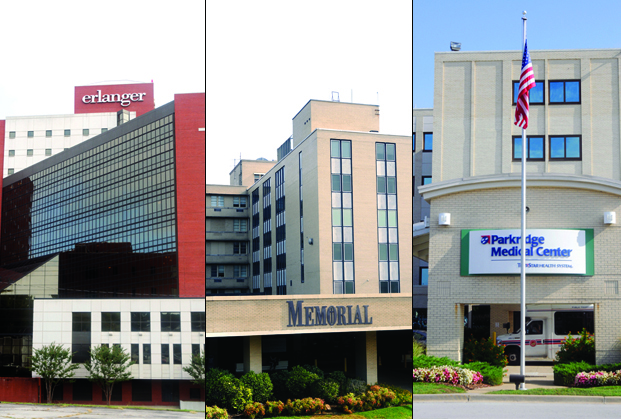TENNESSEE DATAReferral Number Average readmissionRegion // Hospitals // PenaltyKnoxville // 24 // 0.49 percentMemphis // 25 // 0.58 percentNashville // 42 // 0.47 percentChattanooga // 6 // 0.15 percentSource: Kaiser Health NewsNATIONAL DATAState // Number of hospitals // Average penaltyNation // 3,367 // 0.28 percentNew Jersey (highest) // 64 // 0.67 percentTennessee 9th in nation) // 97 // 0.43 percentAlabama (19th in nation) // 95 // 0.29 percentGeorgia (24th in the nation) // 108 // 0.23 percentIdaho (lowest) // 14 // 0 percentSource: Kaiser Health NewsREGIONAL DATAHospital // City // Penalty*DeKalb Regional Medical Center // Fort Payne, Ala. // 0.27%Floyd Medical Center // Rome, Ga. // 0%Gordon Hospital // Calhoun, Ga. // 0.67%Hamilton Medical Center // Dalton, Ga. // 0.03%Hutcheson Medical Center // Fort Oglethorpe // 0.02%Murray Medical Center // Chatsworth, Ga // 0.12%Athens Regional Medical Center // Athens, Tenn. // 0%Erlanger Medical Center // Chattanooga // 0.08%Grandview Medical Center // Jasper, Tenn. // 0.09%Memorial Healthcare System // Chattanooga // 0%Parkridge Medical Center // Chattanooga // 0%SkyRidge Medical Center // Cleveland, Tenn. // 0.7%*Penalty for 2013Source: Kaiser Health NewsONLINETo learn more about Kaiser Health News' analysis or to find readmission penalties by state or individual hospital visit http://tinyurl.com/c4weqf2.
Most Chattanooga-area hospitals readmit fewer patients within 30 days of discharge than state and national averages, which means they will be docked less on their Medicare payments beginning in October.
However, as a state, Tennessee ranked ninth-highest in the nation for how much hospitals will be penalized, while Alabama came in 19th and Georgia 24th.
As part as an initiative to drive down health care costs, the Centers for Medicare and Medicaid Services will reduce overall Medicare payments to hospitals with high readmission rates. This year, beginning Oct. 1, hospital payments can be reduced as much as 1 percent. Next year, reductions can go up to 2 percent and then are capped at 3 percent in 2014.
Memorial Healthcare System and Parkridge Health System had no penalty this year, and Erlanger Health System will have a 0.07 percent reduction, the analysis found.
No area hospital will face the maximum rate reduction. SkyRidge Medical Center in Cleveland was the only area hospital to exceed state and national averages and will have a 0.70 percent reduction in payments. SkyRidge officials said they have established a readmission work group that includes a nurse discharge advocate who works with patients and representatives from outside agencies to reduce readmissions.
"Through the work of this team, our readmissions have been declining over the past year, which will be reflected in future updates," SkyRidge CEO Coleman Foss said in an emailed statement.
Nearly 2 million Medicare beneficiaries are readmitted within 30 days of release each year after initially being admitted for heart failure, heart attack or pneumonia, costing Medicare $17.5 billion in additional hospital bills, according to Kaiser Health News.
The nonprofit news organization analyzed data from CMS and released information for each hospital, calculating the payment reduction as a penalty. More than 2,000 hospitals nationwide will be penalized about $280 million in Medicare funds over the next year, the analysis found.
To calculate the payment rate reductions, CMS looked at readmission rates for heart failure, heart attack and pneumonia patients from July 2008 to June 2010.
Any patient readmitted for any reason counts against the hospital, said David McClure, senior vice president of finance for the Tennessee Hospital Association.
Cooperation called key
"The reason the rates are as low as they are in Chattanooga is because of cooperation between hospitals," McClure said. "We believe the solution is more of a community solution."
McClure said Chattanooga hospitals met with other agencies -- like the Area Council on Aging and Disability -- to help ensure patients will not return to the hospital, such as following up to make sure patients are keeping their doctors' appointments and taking their medication.
The Kaiser Health News analysis found that safety-net hospitals had the greatest reductions in payment, but Erlanger was not among those.
Erlanger spokeswoman Pat Charles said the penalty will cost Erlanger about $4,000 a month, which is "minimal" when compared with penalties other hospitals will have.
"Erlanger's care transition team is working closely with caregivers after patients are discharged, identifying appropriate resources, and even sending pictures [home] of medications that need to be taken, with instructions on how many to take and how often," Charles wrote in an email.
Parkridge had readmission rates below national averages in every category, spokeswoman Alison Counts said. The hospital has implemented various programs to continue to focus on lowering readmission rates, she said.
